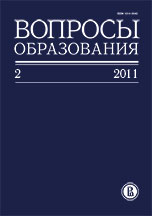Victory in PIRLS and defeat in PISA: the future of reading literacy of 10–15-year-olds
Abstract
PIRLS test indicates a high level of reading literacy of 9–10-year old Russian primary school graduates. PISA test has found a low level of readiness of 15–16-year-old graduates from Russian secondary school to use texts for a wide range of social, educational and everyday problems. To study the dynamics of reading literacy of 10–15-yearold secondary school pupils a special diagnostic technique called “Push-push” was established. This technique combines approaches of PIRLS and PISA. We provide data on reading literacy of pupils of 4, 6th and 9th grade which was estimated using this method. It is shown that two years of training in the Russian secondary school (5th and 6th grades) did not improve children’s ability to understand texts. Ninth grade differs significantly from the 4th in terms of reading literacy but the improvement is very low. The results show that there is a problem in Russian schools with the quality of textbooks and their use in the learning process.









